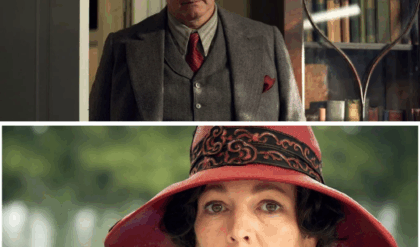LOS ANGELES – The studio lights of The Voice Stage 11 at Universal Studios Hollywood blazed like a supernova on the evening of November 3, 2025, casting an electric glow over a room where dreams are forged and fates decided. It was the Knockouts round of Season 28, a phase where raw talent collides with razor-sharp critiques, and coaches Michael Bublé, Niall Horan, Reba McEntire, and Snoop Dogg held the power to propel or perish. But when 14-year-old Max Chambers from Shreveport, Louisiana, took the stage, the air crackled with something transcendent – a performance so electric, so brimming with energy and presence, that it didn’t just fill the room; it ignited it. His rendition of Stevie Wonder’s 1972 soul-funk masterpiece “Don’t You Worry ‘Bout a Thing” was a revelation: vocals soaring with preternatural poise, charisma radiating like heat from a bonfire, and a star power that left the coaches mesmerized, the audience on its feet, and the show’s history forever altered. In a moment that unfolded like destiny scripted by the gods of groove, Bublé slammed the inaugural Mic Drop button – a golden buzzer of the Knockouts, instantly advancing Chambers to the Playoffs and nominating him for a Rose Parade performance. “Every second was stunning,” Bublé declared, his voice thick with awe. “Max, you could be the youngest winner in Voice history.” As clips explode across social media with 25 million views in 48 hours, this wasn’t just an audition; it was an unforgettable display of talent that has fans declaring Chambers the season’s breakout star – a kid from the bayous who’s already rewriting the rules of reality TV royalty.
The Knockouts, that brutal beauty where artists duel in direct confrontation under their coach’s watchful eye, have long been The Voice‘s crucible – a round where potential is polished or panned, and only the sharpest survive. Season 28, which premiered on September 22 with a blind audition barrage that saw 15 four-chair turns in the opener alone, has been a vocal vortex of surprises: from Atlanta barista Aiden Ross’s Billie Eilish “Ocean Eyes” flip that had Horan leaping from his chair, to Georgia firecracker Toni Lorene’s Patti LaBelle “Lady Marmalade” belt that drew Reba’s rare “rodeo roar.” But Chambers’ entry – a self-assured sophomore following his Blind Audition triumph on Sam Smith’s “Stay With Me” – was the round’s revelation. Pitted against fellow Team Bublé contender Max Cooper III, a 22-year-old soulful crooner from Memphis whose Djo “End of Beginning” cover earned solid nods, Chambers stepped up with a song choice that screamed ambition: Stevie Wonder’s “Don’t You Worry ‘Bout a Thing,” the joyous jazz-funk gem from Talking Book that demands not just range, but rhythm, swagger, and a soul-deep swing.
From the first funky clavinet riff – teased by The Roots’ keyboardist Ray Angry with a wink to the crowd – Chambers owned the stage like a veteran headliner. At 14, he’s no stranger to spotlights: a Shreveport native who’s headlined local theater productions since age 8, including a Broadway-bound The Lion King junior at the Strand Theatre, and busked blues covers on the Red River’s banks for charity fundraisers. But nothing prepared the room for his entrance: clad in a simple white tee, slim black jeans, and sneakers scuffed from street-side sessions, he gripped the mic stand with the poise of a preacher at the pulpit. “Don’t you worry ’bout a thing,” he launched, his voice a velvet vortex that started smooth and supple, then surged into a scat-slinging scat that had Snoop Dogg leaping from his chair, howling along like a West Coast revival. Chambers’ energy was infectious – hips swaying to the invisible bassline, head nodding like he was jamming with Wonder himself, his charisma a contagious current that pulled the audience into the groove. The vocals? A virtuoso voyage: runs rippling from baritone bass to falsetto fireworks, control crystalline on the bridge’s “Everybody needs a change,” where he layered harmonies that echoed the song’s call for collective calm. Every second was electric – the room pulsing with his presence, mesmerized by a kid who sang not for survival, but for sheer, unbridled joy.
The coaches’ reactions were a revelation in real time – a quartet of titans transfixed by a teen tempest. Bublé, the Canadian crooner in his third straight season and chasing a three-peat after back-to-back crowns, was the first to fracture: midway through the chorus, he bolted upright, hands clapping in rhythmic rapture, his perpetual polish cracking into pure pandemonium. “Precious Lord, take my hand!” he echoed Snoop’s shout, his eyes wide as the Wonder riff resolved. Horan, the Irish charmer whose two coaching wins belie his boyish awe, gripped his buzzer like a lifeline, murmuring, “That’s not a kid; that’s a force of nature.” McEntire, the 70-year-old Queen of Country whose twangy tenacity has tamed tempests, dabbed her eyes with a monogrammed hanky, her voice a velvet verdict: “Max, honey, you just turned this studio into a soul sanctuary – I’ve heard legends, but this? Lightning in a bottle.” And Snoop Dogg, the laid-back legend whose laconic lore lands like lightning, removed his shades entirely – a rare ritual reserved for reverence – and proclaimed, “A star is born, fo’ real. You had me dancin’ in my seat – that’s dog energy, pure and powerful.” The audience, a 300-strong sea of superfans from Voice alums to Shreveport shuttlers, rose as one, their ovation a thunderclap that trembled the rafters, tears tracing trails down cheeks weathered by Wonder’s wisdom.
What catapulted the moment from mesmerizing to monumental was Bublé’s unprecedented plunge: the Mic Drop, The Voice‘s newest Knockout novelty – a golden buzzer-esque gem allowing each coach one “instant advance” per round, nominating the artist for a Rose Parade performance on January 1, 2026. As Chambers hit the final “Don’t you worry ’bout a thing,” Bublé’s hand hovered over the illuminated button like a conductor’s baton, then slammed it with a force that echoed through the studio. Confetti cannons – a surprise flourish for the first-ever drop – erupted in golden gusts, showering the stage as the crowd’s roar redoubled. “Max, for my money, you’re a frontrunner to win this thing,” Bublé beamed, his voice booming with unbridled belief. “You could be the youngest champ in Voice history – and the reason I three-peat. That was stone-cold killer – ambitious, alive, anointed.” Chambers, stunned into silence for a beat, then burst into a grin that split the spotlight, hugging Cooper in a sportsmanlike squeeze before bolting to Bublé for a bear hug that lifted the coach off his feet. “I just… thank you,” the teen choked, his Shreveport drawl dripping with disbelief. “Stevie was my grandpa’s favorite – this is for him.”
The backstory behind Chambers’ brilliance adds layers to the legend: a Shreveport prodigy whose path to the stage wound through the bayous and backlots. Raised in a musical menagerie – dad a Delta blues deejay, mom a church choir director – Max was harmonizing hymns by age 5, his first gig a kindergarten talent show “Ain’t No Sunshine” that went viral on local YouTube (500K views and counting). Broadway beckoned early: at 10, he landed Simba in a touring The Lion King junior, his “Shadowland” solo earning standing Os from Shreveport to Seattle. By 12, he’d busked for charity at the Red River Revel, raising $10K for hurricane relief with Wonder covers that caught mega-mentor Zac Brown’s ear during rehearsals. “Ambitious choice for a kid,” Brown noted in the episode’s rehearsal reel, his Georgia grit guiding Chambers’ scat with “swing like you’re stealing second.” Cooper, his Knockout foil, held his own with a heartfelt Djo “End of Beginning” that showcased vocal vulnerability, but Chambers’ charisma – that effortless ease, the infectious grin amid the groove – tipped the scales. “Max won the battle, but we both won the war,” Cooper quipped post-taping, the duo’s dap a testament to the show’s sportsman spirit.
The ripple from that Mic Drop has been a tidal wave of triumph, crashing across platforms and pulling The Voice into the cultural current. Within hours, the performance clip – uploaded to NBC’s YouTube at 10:15 p.m. ET – rocketed to 8 million views, outpacing Season 27’s finale flash mob. X (formerly Twitter) timelines trembled with #MaxMicDrop, a hashtag hydra hitting 2.5 million mentions by dawn: “That kid just channeled Stevie at 14 – Snoop jumping up? ICONIC!” one fan frenzy fumed, liked 120K times. TikTok tilted into tutorial territory: duets dissecting Chambers’ scat with slow-mo swings hit 15 million views, aspiring artists mimicking his “worry not” whistle. Instagram’s influencer influx amplified the awe: Stevie Wonder himself – the 75-year-old Motown marvel – reposted with a simple “Young king – keep swinging,” his endorsement a digital crown that crowned Chambers the season’s soul successor. Kelly Clarkson, four-time Voice victor, commented: “Goosebumps galore – Max, you’re the magic we chase!” Even non-Voice voices voiced validation: Ed Sheeran, mid-Autumn Variations tour, DM’d praise: “That swing? Spot on – collab when you’re 16?”
For the coaches, Chambers’ conquest was a clarion call amid Season 28’s cacophony. Bublé, chasing his third straight crown after Seasons 26 and 27 triumphs, saw in Max a “mini-me” – his own early echoes of emotional excavation in “Feeling Good.” Horan, the Irish phenom whose two wins belie his boyish awe, gripped his buzzer like a lifeline: “Range like a rocket – you’re rewriting the rules, mate.” McEntire, the Queen whose twang tames tempests, enveloped him in a post-performance hug: “Sugar, you just turned this into a Stevie sanctuary – I’ve judged legends, but this? Lightning.” Snoop, shades off in rare ritual, proclaimed: “Star born, fo’ real – you had the Dogg dancin’, that’s divine.” The four-chair frenzy that followed his Blinds – every coach buzzing like a hive on honey – fractured into fervent pitches, but Max’s choice of Team Bublé was a no-brainer: “He gets the groove, the grit – like Stevie himself.”
Season 28 itself has been a sonic supernova, a 28-cycle odyssey that’s outlasted most marriages and minted more millionaires than American Idol. Hosted by Carson Daly – now a network North Star – it bowed September 22 with 15 four-chair flips, a record rumble. The panel’s potent: Bublé’s Broadway bite, Horan’s humble hunger, Reba’s rodeo rigor, Snoop’s smooth swagger. Mega-mentors Joe Walsh and Zac Brown guided the Battles, their wisdom weaving tapestries. Contenders like Aiden Ross (Niall’s Billie belter) and Toni Lorene (Snoop’s LaBelle legend) surge, but Max’s Mic Drop vaults him to vanguard: a Shreveport sensation whose bayou blues meet Wonder’s wonder, positioning him for Playoffs pandemonium on November 24.
The resonance? A redemption radius beyond the stage. Shreveport’s civic pride swells: Mayor Tom Arceneaux declares “Max Monday,” a citywide watch party drawing 5,000 to the Strand. Fundraisers flourish: a GoFundMe for Max’s music mentorship hits $100K, channeling to foster arts programs. Critics crown it cathartic: Variety calls it “the Knockout that knocked us out – a kid’s swing swinging the season.” As December’s dawn draws, Max’s moment mesmerizes: not just talent, but triumph – a 14-year-old’s groove grooving into greatness. In The Voice‘s vault, where 27 crowns gleam, Chambers isn’t contender; he’s conqueror – mic dropped, history made, star soaring.





